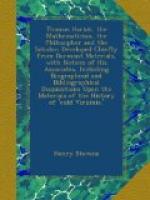HENRY N. STEVENS,
Literary Executor of the late
Henry Stevens of Vermont.
39, Great Russell Street,
London, W.C.
_ 10th February, 1900._
-------------------------------------------------------
------------------ THOMAS HARIOT
AND HIS
ASSOCIATES
COLLECTORS OF RARE English books always speak reverently and even mysteriously of the ‘quarto Hariot’ as they do of the ‘first folio.’ It is given to but few of them ever to touch or to see it, for not more than seven copies are at present known to exist. Even four of these are locked up in public libraries, whence they are never likely to pass into private hands.
One copy is in the Grenville Library; another is in the Bodleian; a third slumbers in the University of Leyden; a fourth is in the Lenox Library; a fifth in Lord Taunton’s; a sixth in the late Henry Huth’s; and a seventh produced £300 in 1883 in the Drake sale.
The little quarto volume of Hariot’s Virginia is as important as it is rare, and as beautiful as it is important. Few English books of its time, 1588, surpass it either in typographic execution or literary merit. It was not probably thrown into the usual channels of commerce, as it bears the imprint of a privately-printed book, without the name or address of a publisher, and is not found entered in the registers of Stationers’ Hall. It bears the arms of Sir Walter Raleigh on the reverse of the title, and is highly commended by Ralfe Lane, the late Governor of the Colony, who testifies, ’I dare boldly auouch It may very well pass with the credit of truth even amongst the most true relations of this age.’ It was manifestly put forth somewhat hurriedly to counteract, in influential quarters, certain slanders and aspersions spread abroad in England by some ignorant persons returned from Virginia, who ’woulde seeme to knowe so much as no men more,’ and who ’ had little vnderstanding, lesse discretion, and more tongue then was needful or requisite.’ Hariot’s book is dated at the end, February 1588, that is 1589 by present reckoning. Raleigh’s assignment is dated the 7th of March following. It is probable therefore that the ’influential quarters’ above referred to meant the Assignment of Raleigh’s Charter which would have expired by the limitation of six years on the 24th of March, 1590, if no colonists had been shipped or plantation attempted. It is possible also that Theodore De Bry’s presence in London, as mentioned below, may have hastened the printing of the volume.
Indeed, the little book professes to be only an epitome of what might be expected, for near the end the author says, ’ this is all the fruits of our labours, that I haue thought necessary to aduertise you of at present;’ and, further on, ’ I haue ready in a discourse by it self in maner of a Chronicle according to the course of times, and when time shall bee thought conuenicnt, shall also be published.’




